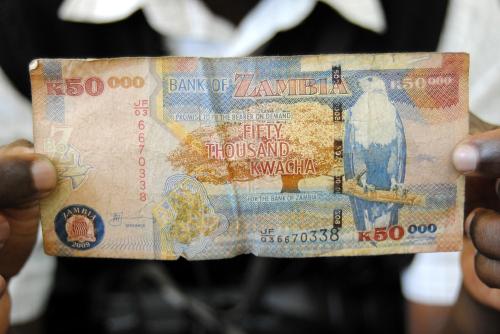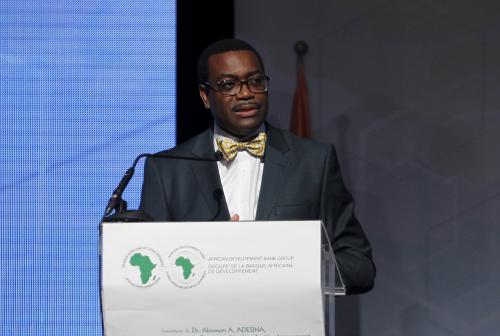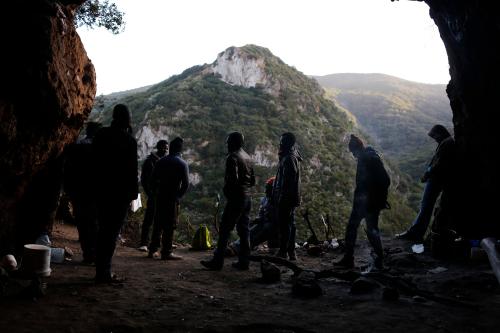High inflation prompts record interest rate hike in Zambia
Low copper prices, drought, and power shortages continue to stifle the troubled Zambian economy, leading it to its slowest expansion in 17 years. Over the past year, Zambia’s currency, the kwacha, has lost nearly half of its value against the dollar, and from September to October 2015, inflation soared to a six-year high, nearly doubling consumer prices from 7.7 percent to 14.3 percent. In an attempt to rein in the sharply climbing inflation, the Central Bank of Zambia announced on Tuesday that it would boost interest rates from 12.5 percent to 15.5 percent. Governor Denny Kalyalya justified this record increase—which could further undercut the country’s already waning growth—stating that: “We want to promote growth but, for now, inflation for us is a bigger evil going forward.”
In other news, Zambian President Edgar Lungu announced on Thursday that Glencore, a Swiss mining firm that operates copper mines in Zambia, would not be allowed to carry out a planned 18-month suspension of the Mopani mining complex, which it had scheduled in order to refurbish the mine and also reduce the firm’s debt as copper prices continue to plummet. During this time, Glencore planned to lay off 4,000 workers and even more contractors, exacerbating poverty in a region where people are highly dependent on the copper industry for their livelihoods. President Lungu declared that if Glencore could not continue its operations, Zambia would find other investors to take over copper production. On Friday, the kwacha weakened further amid concerns that the government may increasingly intervene in the economy before elections in 2016.
Africa’s leading telecommunications firm charged with $5.2 Billion fine in Nigeria
Last week, the Nigerian Communications Commission (NCC) fined the Johannesburg-based MTN Group Ltd.—one of Africa’s leading mobile phone operators with 233 million subscribers across 22 African countries—$5.2 billion for failure to disconnect customers with unregistered SIM cards and having incomplete data. On Monday, the Johannesburg stock exchange halted the trading of MTN Group Ltd. shares as the company’s bonds dropped for a third consecutive day. MTN has sent a letter to the NCC, apologizing for the transgression and asking for leniency.
Nigerian Senator Ben Murray-Bruce has condemned the fine, defining it as “the most damaging action ever taken against Nigeria’s drive for foreign direct investment.” MTN is the market leader in Nigeria’s mobile phone market. With Nigeria’s current economic woes, the fine—higher than Nigerian government’s second quarter oil revenue—has been perceived as the Buhari administration’s precarious way of dealing with austerity issues without cutting spending. Foreign investors are already wary of the precarious Nigerian economic climate, which could drive the central bank to devalue the Naira in the upcoming months.
Rwandan in a dispute over its poverty statistics
Rwanda’s poverty estimates came into question when an article in FRANCE24 raised concerns that Rwandan authorities had manipulated its poverty data to make it look like it was going down when it was actually on the rise. According to the claims by Antwerp-based Professor Filip Reyntjens, changes were made to the methodology—the poverty line, consumption thresholds, and consumption definitions, specifically—making comparisons to the previous round the “Integrated Household Living Conditions Survey (EICV)” misleading. The Integrated Household Living Conditions Survey is a series of surveys started in 2000/01 and designed to monitor poverty and living conditions in Rwanda. The latest round of the EICV4 released in September showed that the poverty rate in Rwanda fell by 5.8 percentage points between 2011 and 2014 to 39.1 percent.
The director-general of the National Institute of Statistics of Rwanda, Yusuf Murangwa, has refuted these allegations as being “fundamentally wrong.” While no changes were made to the definition of poverty, he acknowledged updates to the composition of food basket that were “long overdue” and disclosed in the report. Finance Minister Claver Gatete also dismissed the allegations ensuring that there was full transparency in the calculations. The International Monetary Fund (IMF) and the U.K. Department of International Development also dismissed any concerns, stating that any changes to the methodology were justified. On Wednesday, the IMF raised Rwanda’s 2015 economic growth forecast to 7 percent from 6.5 percent, citing the resilience of the Rwandan franc against a globally strong dollar.






Commentary
Africa in the News: Zambia hikes interest rates, Nigeria fines MTN, Rwanda accused of manipulating poverty statistics
November 6, 2015